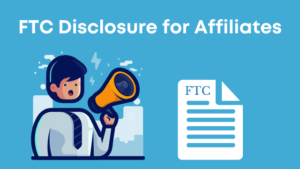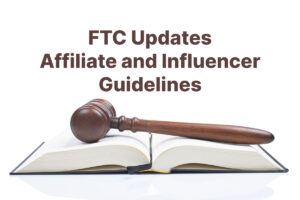
Affiliate marketing as a growing and commonly adopted digital marketing policy has increased rapidly contributing to enhanced oversight by regulatory bodies. The USA Federal Trade Commission is one of the entities that have stepped up its well-informed and influence investigations and legal enforcement of the affiliate marketing revelation and FTC influence advertising guidelines. The article reviews the considerations to the FTC instruction to affiliate marketers to clarify the possible implications and relevant strategic recommendations.

Understanding FTC Guidelines
Ultimately, the FTC, responsible for enforcing federal laws governing competition and consumer protection, significantly impacts affiliate marketing by enforcing the system’s honesty and transparency. Moreover, by established FTC social media guidelines and FTC affiliate disclosure requirements, affiliates are required to disclose their partnership with any presented brands without any ambiguity and make sure any statements promoting brands or their services are accurate and can be proved to protect consumers’ best interests.
The Importance of Disclosure
The FTC mandate’s guiding principle is the clear affiliate disclosures in any form of promotional content that could result in the affiliate earning. The concept is grounded in the need to be open and honest with the consumers; by disclosing the presence of affiliate links in content, the public can distinguish promotional works.
The Ramifications of Non-Compliance
Ignoring the FTC endorsement guidelines and FTC disclosure guidelines can lead to severe legal consequences for affiliates. In instances of non-compliance, the FTC’s response may range from issuing notices to initiating legal action, potentially culminating in hefty fines and damage to the affiliate’s reputation.
Navigating FTC Compliance: Practical Tips
In conclusion, affiliate marketers should pay close attention to this expertise and adequately perform FTC compliance influence and affiliate marketing declaration. The FTC is the guardian of consumer stability and is generally opposed to misleading publicity. Thus, utmost performance of FTC guidelines, publicity for popularity partnership, and affiliate marketers are advised below here.
![]()
Clear Disclosure:
Here are a few sample affiliate disclosure statements you might consider for your content. The language you choose should align with your unique voice and adhere to the most current FTC regulations or those set forth by your governing agency, reflecting a commitment to honest affiliate marketing disclaimer practices.
- Example 1: Simple and Direct Disclosure
Disclosure: As an illustration of affiliate link disclosure, some of the links below are affiliate links. This means, at no extra expense to you, I will earn a commission if you click through and make a purchase, exemplifying transparent affiliate disclosures. - Example 2: Friendly and Informative Disclosure
Hey friends! Quick affiliate disclaimer: the links to [Product/Service Name] on this page are affiliate links. If you decide to make a purchase, I might earn a small commission at no additional cost to you. This support enables me to continue crafting quality content for you. Your support is much appreciated! - Example 3: Detailed and Transparent Disclosure
In the spirit of full affiliate disclosures, I want to inform you that I’ve included certain products and links on this site that will earn me an affiliate commission for any purchases you make. My aim is to educate you on what’s possible for bloggers in various niches, and please know that I run this as a for-profit venture. If you choose to buy through my affiliate links, it supports my efforts and is deeply valued. - Example 4: Brief and Prominent Disclosure
Important notice: This post features affiliate links. In line with affiliate links disclosure guidelines, I may receive a commission if you click on a link and make a purchase, without any additional cost to you. - Example 5: Personal and Reassuring Disclosure
I’m committed to authenticity and only recommend products I trust. This post may include affiliate links that, at no extra cost to you, may earn me a small commission. Such affiliate links disclosure helps keep this site running and allows me to share my experiences with you. - Example 6: In-Depth and Educational Disclosure
In the spirit of full transparency and as a part of my affiliate marketing disclaimer, I’d like to inform you that certain links on my website are affiliate links. Clicking on these links and making a purchase may earn me a commission at no additional cost to you. This affiliate link disclosure is to clarify that such commissions support the ongoing creation of valuable content. Rest assured, I only endorse products or services that I’ve thoroughly vetted and believe will add value to you, as exemplified by various affiliate link disclosure examples.
It’s crucial not only to have an affiliate disclaimer but to ensure it’s prominently placed for easy access and comprehension by readers prior to engaging with any affiliate links. To adhere to the best practices and current regulations, it’s wise to periodically reassess your affiliate disclosures.
- It’s essential for affiliates to make their relationships with brands crystal clear. A robust affiliate marketing disclaimer should be prominently displayed, easily noticeable rather than tucked away in footnotes or obscured by hyperlinks. This ensures that the affiliate disclosures meet the FTC’s standards for clarity and visibility.
- Affiliates should ensure that their disclosures are in close proximity to the affiliate links, ideally in plain sight without the need for scrolling or clicking. On social platforms, it’s imperative that these disclosures are part of the main content, not relegated to a profile bio or the bottom of a lengthy post, in line with FTC influencer guidelines and affiliate link disclosure examples.
- Employ clear and accessible language that resonates with the general audience. Statements such as ‘I may receive a commission for purchases made through this link’ embody the essence of transparent affiliate disclosures and affiliate link disclosure examples, ensuring clarity for the reader.
Honest Reviews and Endorsements:
- It’s essential to only offer endorsements for products you’ve either personally used or extensively researched. Providing misleading brand endorsements for products you haven’t experienced contravenes FTC endorsement guidelines and can erode consumer trust.
- Maintaining trust and credibility with your audience hinges on honest advertising, which includes being forthright about your product experiences. If a product has drawbacks or negative features, sharing these insights helps foster consumer understanding and preserves your integrity.
Making Claims:
- When making an advertising claim about a product, ensure it’s supported by scientific evidence or verifiable manufacturer’s information. For instance, claims about a supplement’s weight loss efficacy should be substantiated by clinical studies to be credible.
- Utilize online reviews and testimonials responsibly, ensuring that any claims made reflect typical results that the average consumer can expect. If not, it’s imperative to clearly communicate the realistic expected outcomes to avoid misleading your audience.
Social Media:
- For clarity on social media platforms like Instagram or Twitter, employ unambiguous hashtags such as #ad or #sponsored to align with FTC social media guidelines. Avoid potentially vague tags like #collab, #ambassador, or #thanks, which may not meet the FTC’s standards for transparency.
- When creating video content, such as YouTube videos, it’s crucial to include video content disclosure in accordance with FTC guidelines for influencers. Ensure that disclosures are clearly articulated within the video itself (either spoken or displayed as on-screen text) and reiterated in the video description to maintain transparency with your audience, especially if you’re among the social media influencers.
Email Marketing:
- For email disclosures involving affiliate links, it’s essential to place the affiliate link disclosure prominently at the beginning of the email. Adhering to FTC affiliate disclosure requirements means avoiding the pitfall of hiding the disclosure at the end or in inconspicuous small text.
Monitor Your Affiliates:
- If you are someone who manages an affiliate network, it’s your duty to equip your affiliates with comprehensive guidelines for FTC compliance and to diligently monitor natural ad practices. Be aware that the FTC can hold you accountable for their actions, making affiliate reporting and adherence to FTC guidelines for influencers a top priority.
Keep Up-to-Date with FTC Guidelines:
- Staying abreast of the latest FTC disclosure guidelines is vital for maintaining compliance. Regularly visit the FTC’s official website and consider subscribing to FTC updates to ensure you’re informed of any changes to the FTC affiliate disclosure requirements.
Training and Education:
- Investing time in educating on FTC guidelines is critical for you and your team to avoid the pitfalls of misunderstanding the rules. A thorough grasp of FTC guidelines for influencers is essential to prevent accidental non-compliance.
Record-Keeping:
- Maintain meticulous records of your marketing practices and disclosures. In the event of an FTC investigation, having detailed records can prove to be invaluable in demonstrating your compliance efforts.
Consult with Legal Professionals:
- If you find yourself uncertain about specific elements of your affiliate marketing strategies, it’s wise to seek advice from a legal professional with expertise in advertising law. Consulting with a specialist can help clarify any ambiguities and ensure your practices are in line with legal standards.
Remember, the objective of FTC compliance isn’t solely to evade legal repercussions; it’s fundamentally about forging trust with your audience. Engaging in transparent marketing practices can cultivate stronger consumer relationships, potentially leading to enhanced loyalty and a boost in sales over time.
FTC Disclosures 101 for Social Media Influencers
The link below will take you to the FTC’s resource page. There you will be able to better understand the requirements to keep your affiliate marketing website in compliance with their regulations. 
https://www.ftc.gov/business-guidance/resources/disclosures-101-social-media-influencers
The Path to Affiliate Marketing Success
In the cutthroat realm of affiliate marketing, ensuring FTC compliance transcends a mere legal obligation; it’s a strategic imperative. By embracing the FTC guidelines, companies can solidify trust with their customers, safeguard their reputation, and pave the way for sustained success.
In conclusion, mastering the legal intricacies of affiliate marketing may appear challenging, yet with a solid grasp of the FTC guidelines and a steadfast commitment to compliance, businesses can advance with confidence. By placing a premium on transparency, integrity, and consumer protection, companies not only sidestep legal snares but also strengthen their bonds with customers and affiliates, fostering a foundation of enduring trust.
FAQ’s 
The Federal Trade Commission (FTC) has guidelines in place to ensure that affiliate marketers operate transparently and honestly. Here are some frequently asked questions (FAQs) to help you understand FTC compliance in affiliate marketing:
1. What is the FTC’s stance on affiliate marketing disclosures?
The FTC requires that affiliate marketers clearly and conspicuously disclose their relationships with the advertisers whose products or services they promote. This means that consumers should be informed whenever a marketer stands to gain financially from their recommendations or content.
2. How should disclosures be made?
Disclosures should be made in a way that is easy to notice and understand by the average consumer. They should be close to the claims to which they relate, in a font that is easy to read, and in a color that stands out against the background. For videos, disclosures should be on the screen long enough to be noticed, read, and understood.
3. What happens if I don’t comply with the FTC guidelines?
Failure to comply with FTC guidelines can result in enforcement actions, including legal penalties, fines, and damage to your reputation. The FTC has taken action against both affiliate marketers and the companies whose products they promote.
4. Are bloggers and social media influencers subject to the same rules?
Yes, bloggers and social media influencers are considered affiliate marketers if they earn money or receive other compensation for promoting products. They must disclose their relationships with brands in their posts.
5. What phrases can I use for disclosures?
You can use clear and unambiguous language like “Sponsored,” “Promotion,” “Paid ad,” “Ad,” or “Affiliate link.” Avoid vague terms such as “Thanks to [Brand],” or “#partner,” which might not be understood as disclosures by all consumers.
6. Does the FTC provide any resources to help understand compliance?
Yes, the FTC has published various resources, including guidelines and FAQs, to help marketers understand their responsibilities. The “FTC Endorsement Guides” and “Dot Com Disclosures” are particularly helpful documents available on the FTC’s website.
7. What is the key takeaway for affiliate marketers?
The key takeaway is that transparency is crucial. As an affiliate marketer, you must be open about your relationship with the brands you promote to ensure that consumers can make informed decisions based on your content.
8. Is it necessary to disclose every single affiliate link?
Yes, each piece of content that includes an affiliate link should have a disclosure. It’s not enough to have a single disclosure on your site that covers all affiliate content.
9. Do I need to disclose free products or services?
Yes, if you are reviewing or promoting a product or service that you received for free, you must disclose this fact because it could influence how people perceive your endorsement.
10. Can I make disclosures in the terms of service or on a separate page?
No, disclosures should not be solely in the terms of service or on a separate page. They must be clear and prominent within the content where the endorsement or affiliate link appears.
Statistics and Enforcement:
The FTC doesn’t regularly publish specific statistics on enforcement actions against affiliate marketers. However, it is known that the FTC actively monitors compliance and has taken action against entities ranging from individual influencers to large corporations.
For more detailed guidance and the latest updates on FTC compliance for affiliate marketing, please click the link above or consult with a legal professional who specializes in advertising and consumer protection law. It’s also important to stay updated on any changes to these guidelines, as the FTC may update its policies and enforcement practices.
Please take a look at a couple of helpful articles on affiliate marketing.
regards,
Bernard B


Amazing blog! Do you have any recommendations for aspiring writers?
I’m hoping to start my own site soon but I’m a little lost on everything.
Would you propose starting with a free platform like
Wordpress or go for a paid option? There are
so many choices out there that I’m totally overwhelmed ..
Any recommendations? Many thanks!
Hi,
Thanks for the kind words. I think roughly half the bloggers and content creators use Word Press, so it’s extremely popular. It can be intimidating at first but there are excellent training videos on YouTube that can answer any and all questions you might have. I use WordPress as part of the affiliate marketing platform, Wealthy Affiliate. They have excellent step-by-step training on creating content and become an expert on WordPress. I started off with their free plan, but I want to create multiple websites to market things that I and my family are passionate about, so I upgraded.
Even if you only want to write content, I recommend their platform because they will maintain your WordPress site for you, and give you a free domain name, etc. so you never have to worry about the technical aspects of having a blog.
I hope that helped answer some questions. If you have more feel free to contact me.
regards
Bernard